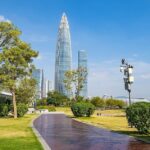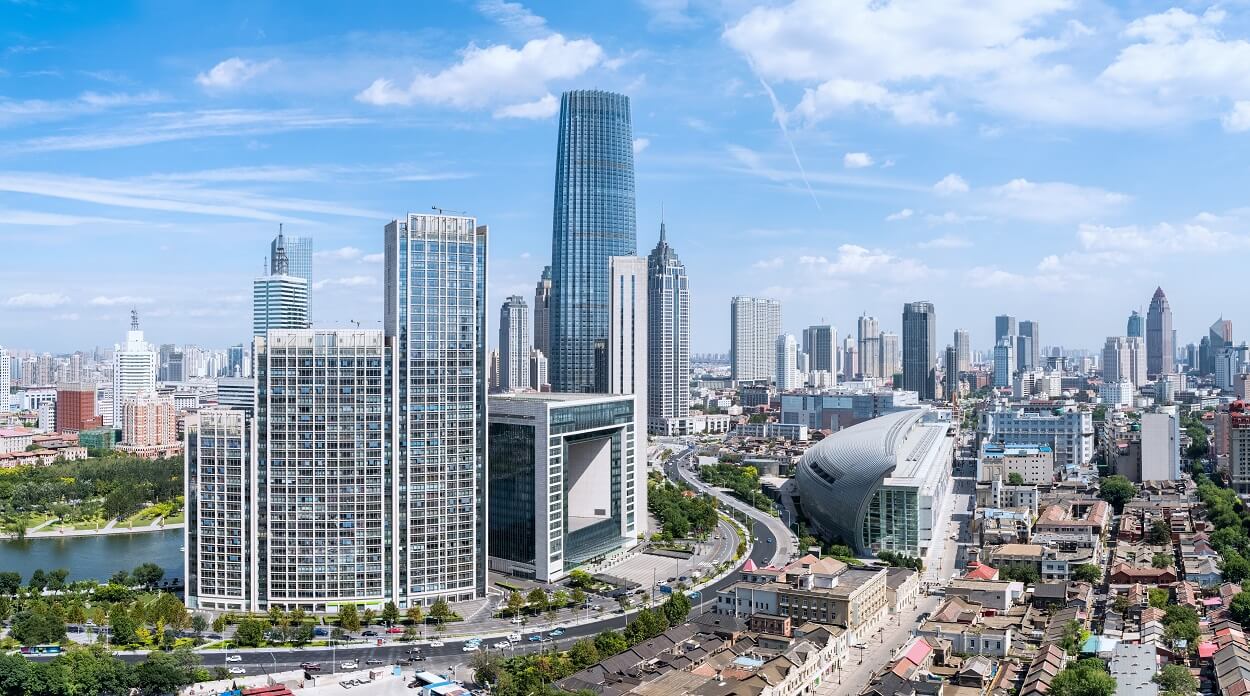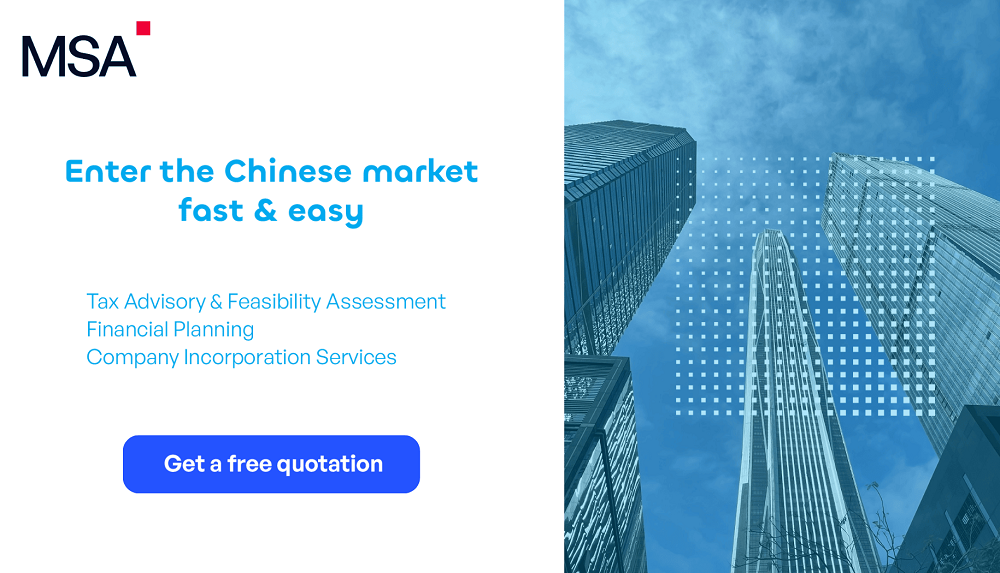As China rises as a dominant force in the global economy, more and more investors are pursuing strategic growth opportunities for their business in China. Increasingly over the years, regional cities have emerged in economic growth and output, alongside the major cities of Shanghai, Beijing, Guangzhou and Shenzhen. Tianjin, one of China’s largest cities, is a bustling financial hub that foreigner investors should consider when looking to invest in China. This article provides an overview of Tianjin and highlights the advantages that make it an attractive destination for investment.

Doing Business in China
If you want to learn more about Doing Business in China, you’ve come to...
Read moreTianjin Statistics
Tianjin is a northern Chinese city strategically located on the Bohai Sea, and connects the Yellow River and Yangtze River, and serves as a vital import and export center, and a port city for Beijing.
The 2020 Chinese national census, reported a population of 13,866,000 for the city of Tianjin, making it the 6th largest municipality in mainland China, and is among the top 20 in the world.
Tianjin is among four cities directly governed by the State Council of the Chinese government and holds the same administrative rank as a province due to its size and economic activity. Within the city’s state managed economic zone, 40% of the greater Tianjin area is agricultural.
Tianjin also has one of the largest GDPs in China. In 2022, its GDP reached approximately 1.63 trillion yuan, a slight increase from 1.57 trillion the year before. Despite the outbreak of the pandemic in 2020, the GDP of Tianjin remained stable, with only a very minor drop from 2019 to 2020 and rebounding into growth for 2021.
Doing Business in Tianjin: Key Factors to Consider
Infrastructure
Tianjin is a major port city for most of northern China, particularly Beijing. Due to its strategic importance, the port of Tianjin is a state-owned enterprise and is managed by a mixture of foreign and domestic corporate bodies. The port provides a comprehensive range of services including logistics, transportation, passenger ferry, and shipbuilding and repair. Given the weather conditions in the northeast of China, there are icebreakers that help keep the port open during the winter months in Tianjin.
The Tianjin Binhai International Airport is about 30 minutes outside the city center and offers a wide variety of domestic flights as well as a few international connections. Its main strength is serving as a main hub for Tianjin Airlines and Xiamen Air, as well as a connection for Air China.
Tianjin is also connected to China’s rail system. There is a passenger rail that runs to Beijing, and freight rail lines that run from the port to inland China.
International Organization Presence
Although Tianjin does not play host to any official foreign government presences like embassies or consulates, its proximity to Beijing, which serves as a hub for international affairs, makes it an attractive location for conducting business with foreign entities.
Foreign Business Presence
Tianjin has significant representation of many major global businesses, including hotels and restaurant chains that are familiar to foreigners. With a strong manufacturing base, Tianjin is home to international companies in various industries, including chemicals, electronics, machinery and textiles.
Some of the largest foreign companies in Tianjin include Siemens, Samsung, Caterpillar, Toyota, and Airbus. These companies have established manufacturing facilities, research and development centers, and sales offices in the city. Additionally, there are also a large number of SMEs currently operating in the city across multiple sectors, including consulting, engineering and education.
Obstacles to Setting Up a Business
Setting up a company in China can be a time-consuming process, which can range from several weeks to a couple of months. The region of setup also plays a significant role as there may be specific requirements from the local government.
Check out our WFOE in China page to find out all the steps
What are the Main Business Sectors in Tianjin?
Tianjin is home to a diverse range of businesses from all sectors of the economy, ranging from traditional white-collar sectors like banking and finance to blue-collar industries like manufacturing, refining and production. More than 50 companies generate revenues of over $5 million in the city.
As previously mentioned, it has a strong transportation and logistics sector, due to its reliance on the port’s efficient operations. Notable business activity can be recognized in raw materials and manufacturing with supplies that enter the city from its port. This includes metal, electronic, and chemical production.
While Tianjin maintains a strong manufacturing presence, its economic landscape is shifting away from heavy manufacturing sectors such as steel and concrete and moving towards high-tech manufacturing for electronics, communications, and medicine. Due to its close association with Beijing and having been run by the State Council of the Chinese Government, Tianjin receives significant government funding, driving forward R&D and technology.
Apart from the enterprises based in the city, Tianjin hosts branches of numerous national and international businesses.
The city’s population is also growing rapidly relative to other cities in the region, expected to reach 15.7 million by 2030 from its current population of 13.8 million, making it a prime business development zone.
Notable Tianjin businesses
One of the largest businesses headquartered in Tianjin is the China Bohai Bank Co, established in 2005, and recognized as one of the most modern and Westernized banks in China. Despite not topping the list in terms of revenue, the bank manages the largest amount of assets, surpassing $200M assets under management. With foreign management holdings from Hong Kong and England, while also being classified as a state-run enterprise, the China Bohai Bank Co. serves both individual and corporate clients with a full spectrum of deposit, lending, and trade services.
HNA Technology Co, (formerly known as Tianjin Tianhai Investment), specializes in shipbuilding and maritime supply, and has interests in automation technology and computing. In terms of annual revenue, HNA Technology Co is one of the largest businesses headquartered in Tianjin.
COSCO, a shipping and logistics giant, also has a corporate office in Tianjin. COSCO is not only one of the largest shipping companies in the world but is also one of the major shareholders of the China Bohai Bank.
Imports and Exports
Tianjin is one of the largest import and export hubs in northern China home to the Tianjin Free Trade Zone and the Tianjin Export Processing Zone, which were established by Beijing government officials who wanted to promote the city’s economic activity. The Export Processing Zone has 24/7 customs officials to assist businesses with importing, processing and exporting goods which are not subject to high tariffs and taxes.
Tianjin’s major exports are mechanical and electronic products, with the trend shifting towards more electronic exports.
Setting up a company in Tianjin
The most preferred method for foreign companies to set up a Chinese corporation is through a WFOE (wholly foreign-owned enterprise). This enables the company to operate similarly to an LLC (limited liability company), conduct most business activities, generate profit, issue invoices, and recruit Chinese or foreign employees.
To set up a foreign company in China, you will need:
- A registered Chinese business name and address (standard address or Free Trade Zone address)
- An application to set up a WFOE
- A business license and all relevant corporate financial and legal chops
- All necessary corporate bank accounts, both for finances and for employer-provided benefits such as social insurance or housing
- A Chinese tax ID number
- Any relevant trade certificates or licenses applicable to your business (imports, exports, food, beverages, medicines, alcohol, etc.).
It can also be helpful to engage the services of a tax and legal expert who can help with the ongoing challenges of maintaining a foreign business, such as bookkeeping, tax compliance, payroll, and trademark protection in multiple countries.
Engaging the services of a tax and legal expert can be beneficial for managing the ongoing challenges of maintaining a foreign business. These challenges may include bookkeeping, tax compliance, payroll, and trademark protection in multiple countries. Certain experts can provide valuable assistance with navigating these complexities and ensure that your business remains compliant and legally protected.
The Tianjin Free Trade Zone
The Tianjin Free Trade Zone is the only free-trade zone in North China, and one of ten such zones in the entire country. The Tianjin Free Trade Zone encompasses three major economic activity areas in Tianjin including the airport, seaport, and Binhai New Area downtown city center. Imported goods passing through the FTZ are exempt from tariffs, VAT, and consumption taxes, and can be moved freely as per the company’s needs.
Additionally, companies with addresses within the Tianjin FTZ benefit from a lower corporate tax rate, foreign currency exchange with no fees, simplified customs procedures and enhanced access to warehousing and shipping facilities.
By offering these benefits, the Tianjin Free Trade Zone is a significant contributor to the modernization of China’s economy.





